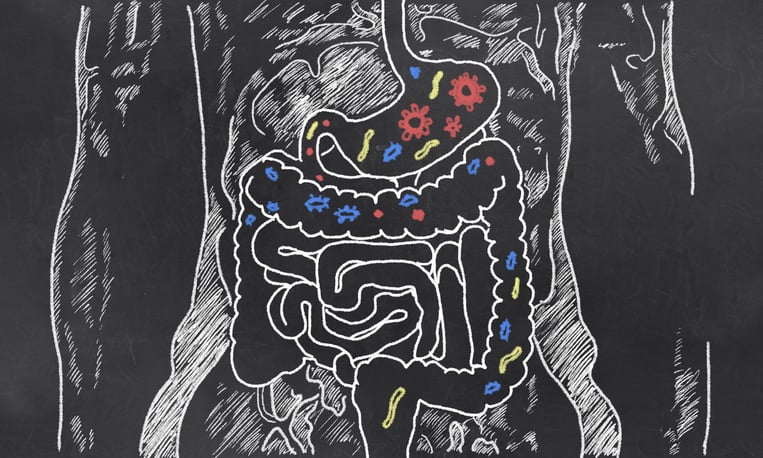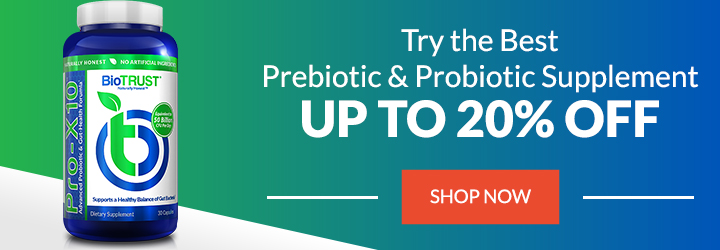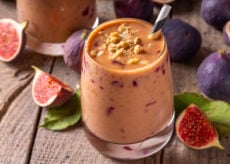8 Overlooked Health Benefits of Probiotics (#3 is surprising)

Probiotics are defined by the Food and Agriculture Organization (FAO) of the United Nations and the WHO as “live microorganisms which, when administered in adequate amounts, confer a health benefit on the host.”1
Simply put, they’re bugs inside our bodies that help us stay healthy. The health benefits of probiotics are recognized and lauded for a variety of reasons. Particularly their ability to help keep harmful microorganisms in check, promote a healthy balance of gut bacteria, support a healthy digestive tract, and aid in digestion and nutrient absorption.
Beyond those health benefits, however, there are several other potential benefits which often go underappreciated. Here are 8 overlooked health benefits of probiotics, which may have effects far beyond the gut.
8 Overlooked Health Benefits of Probiotics
1. Immune Support
One of the more commonly recognized, yet often overlooked benefits of probiotics is that they may help support a healthy immune system. It’s estimated that the digestive system contains over 70% of your immunity.2 Along those lines, probiotics can help the immune system function properly by:1
- Helping support a healthy inflammatory response
- Enhancing intestinal barrier function
- Enhancing antimicrobial activity (which may stop the growth or kill harmful organisms)
- Promoting immunomodulatory activity (i.e., modify the immune response)
In fact, one of the hidden benefits of probiotics may be the ability to stave off upper respiratory infections (URTIs), such as the common cold. In a review of 14 trials, researchers concluded, “Probiotics were better than placebo in reducing the number of participants experiencing episodes of acute URTIs.”3
Further, a review study published in the North American Journal of Medical Sciences found that probiotics may play an important role in the prevention of seasonal allergies, such as hayfever.1,4
2. Mood and Stress Management
The gut is colloquially termed the “second brain.” It has its own entire nervous system network called the Enteric Nervous System (ENS), which has approximately 100 million neurons. The ENS uses/secretes most of the same neurotransmitters as the Central Nervous System (CNS), including half of its dopamine, a large quantity of melatonin, and 90 – 95% of the body’s serotonin, which is heavily involved in feelings of wellbeing and satiety (i.e., fullness). What’s more, one of the best health benefits of probiotics is the ability to down regulate stress response.5
In a study spearheaded by Dr. John Cryan, researchers found that supplementation with Lactobacillus rhamnosus reduced stress and improved mood in mice.6 Studies like these have prompted researchers, including Dr. Cryan, to term certain probiotics, including those in the Bifidobacterium family, “psychobiotics” due to their effects on mood, stress, stress-related behaviors, and wellbeing.5,7
In another study, French researchers found that two weeks of supplementation with a probiotic formulation, including Lactobacillus heretics and Bifidobacterium longum, yielded beneficial psychological effects in healthy human volunteers.8 These included improved feelings of wellbeing, less hostility, and lower cortisol levels.
In a recent study, researchers from Germany systematically analyzed 15 clinical trials to assess the effects of probiotics on mood and behavior. They found that supplementation for at least 4 weeks with probiotics from the Bifidobacterium (e.g., B. longum, B. breve, and B. infantis) and Lactobacillus (e.g., L. helveticus and L. rhamnosus) families improved mood, reduced stress-related behaviors, and improved memory abilities.9 Speaking of which…
3. Cognitive Function
Given the two-way communication between the gut and the brain (i.e., gut-brain axis), it may not come as much of a surprise that one of the benefits of probiotics appears to be improved cognitive function (e.g., focus, memory). Animal studies have shown that optimal function of the gut-brain axis is necessary for normal cognitive performance. And recent evidence shows that changes in the gut microbiota influences cognitive behavior, such as learning and memory.
In a randomized, controlled trial, researchers found that older adults supplementing with probiotics for 12 weeks demonstrated significant improvement in the mini-mental state examination (MMSE) score compared to the control group. The MMSE is a tool used to assess several areas of cognitive function, such as learning, memory, and focus.10
4. Weight Management and Appetite
In a recent systematic review, researchers from China assessed the effectiveness of probiotics on weight loss. The results of their analysis of 25 randomized, controlled trials demonstrated that probiotics significantly reduced body weight, with potentially greater weight loss when a multi-strain probiotic is taken for 8 weeks or longer.11
Probiotics may help support healthy body weight in several ways.12,13 Researchers have referred to gut bacteria as “microscopic puppet masters,” which may control eating behavior by influencing reward and satiety, influencing mood, altering taste receptors, and more.
For instance, when probiotics ferment indigestible fibers, they produce short chain fatty acids (SFCA). This stimulates the release of key hormones that suppress appetite. Believe it or not, gut dysbiosis (characterized by inadequate levels of probiotics) can actually increase the number of calories you absorb from food.14
5. Sports Performance and Recovery
The immune-modifying benefits of probiotics may be of significant importance for athletes. This is because they’re particularly susceptible to URTIs, as heavy exercise can impair the body’s internal defense network and elevate levels of the stress hormones (e.g., epinephrine, cortisol).15 Several studies have shown that probiotics reduce the number, severity, and duration of URTIs in athletes.16
In addition, it’s well established that exercise (particularly endurance exercise) can lead to increased intestinal permeability, more commonly referred to as “leaky gut.” Along those lines, research has shown that probiotics, from both the Lactobacillus and Bifidobacterium families, help prevent leaky gut.17
In a recent review, researchers concluded that “probiotics could be an important tool to improve athletes’ overall general health, performance, and energy availability” while promoting a healthy inflammatory response and redox levels (healthy levels of oxidants versus antioxidants).18
Recently, two randomized, controlled trials demonstrated that supplementation with probiotics reduces muscle damage, improves recovery, and maintains physical performance following intense exercise.16,19
6. Skin Health
Much like the gut houses a robust microbial ecosystem, so too do other organs of the body, such as the skin, mouth, and reproductive organs. Along those lines, it stands to reason that probiotics may be able to support the skin ecosystem.23
Further, acute skin-related issues may be the result of a stress-related immune response. For instance, UV exposure is known to negatively affect immune system function. In one randomized controlled trial, a group of researchers demonstrated that supplementing with Lactobacillus probiotics led to the preservation of skin health and provided sun protection.24
Emerging evidence in this area has led researchers from MIT to suggest that probiotics induce a “glow of health,” referring to their potential to promote radiant skin (and hair), a universal indicator of good health.25 It is speculated that probiotics bestow this “glow” by systemic immune and stress hormone balance. And it’s believed that probiotics possess an array of skin health benefits.26
7. Heart Healthy
Probiotics may also promote cardiovascular health. On one hand, probiotics (such as Lactobacilli and Bifidobacteria) may help maintain healthy blood pressure levels.20 Of course, maintaining healthy blood pressure is crucial to cardiovascular health.
Additionally, probiotics may help maintain cholesterol levels already within the normal range.21 While there are many factors in play, experiments have consistently shown that maintaining healthy cholesterol levels are important for cardiovascular health.22
Interestingly, researchers suggest that one of the benefits of probiotics on your cardiovascular system may be by breaking down bile acid, which is made with cholesterol. Once broken down, the body eliminates cholesterol. In order to make new bile acids, which are necessary for digestion, the liver needs to use more cholesterol, thus lowering cholesterol levels.
8. Detoxification
Probiotics from the Bifidobacterium and Lactobacillus families have been shown to help remove environmental toxins from the gut.27 Specifically, researchers from Belgium found that Bifidobacterium breve and Lactobacillus casei reduced the absorption and increased the excretion of Bisphenol A (BPA), an industrial chemical used for making plastics (for food and beverage storage) and epoxy resins, used to line food and beverage containers.
BPA can leach from these materials into our food and drink supply, and not surprisingly given its ubiquity, government research has shown that 93% of Americans have BPA in our bodies. This is bad news because BPA is a known “endocrine disruptor” and “obesogen.” In other words, BPA can mimic the effects of estrogen in the body. It’s been linked to a wide variety of health problems including infertility, early puberty, diabetes, obesity, and behavioral issues.28,29
Clearly, probiotics can benefit human health in a variety of ways. What’s even more encouraging and exciting is that more research is underway and even more planned to help unfold the story of probiotics.








